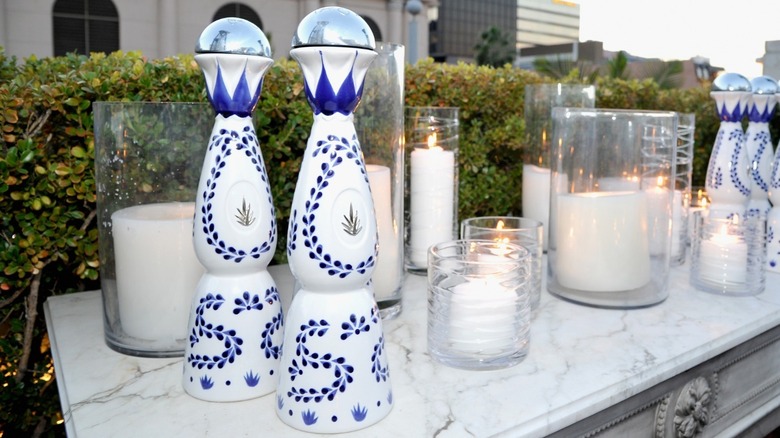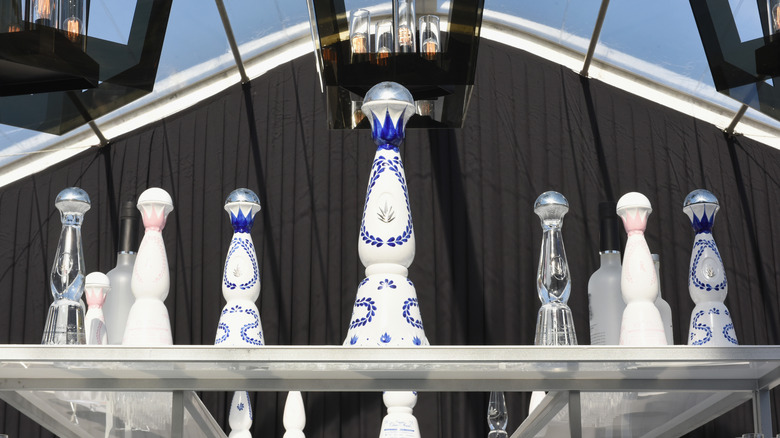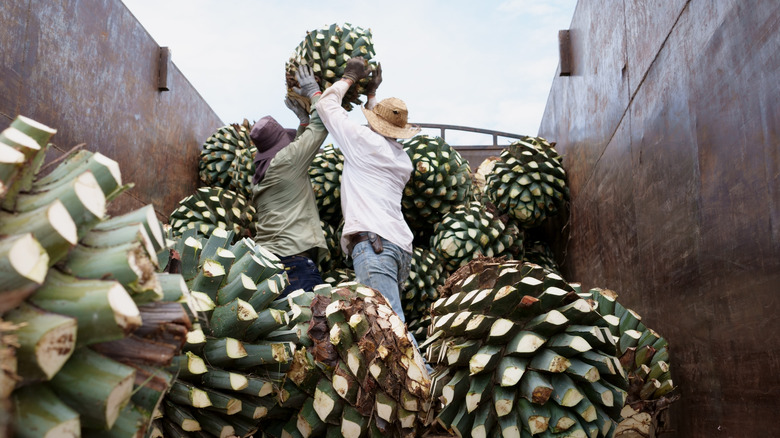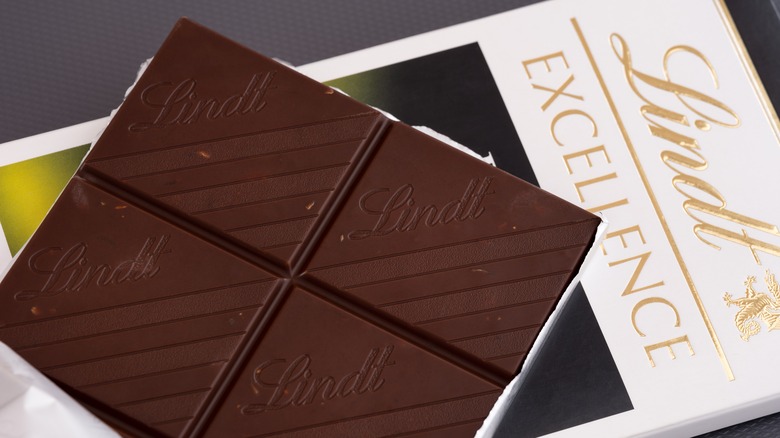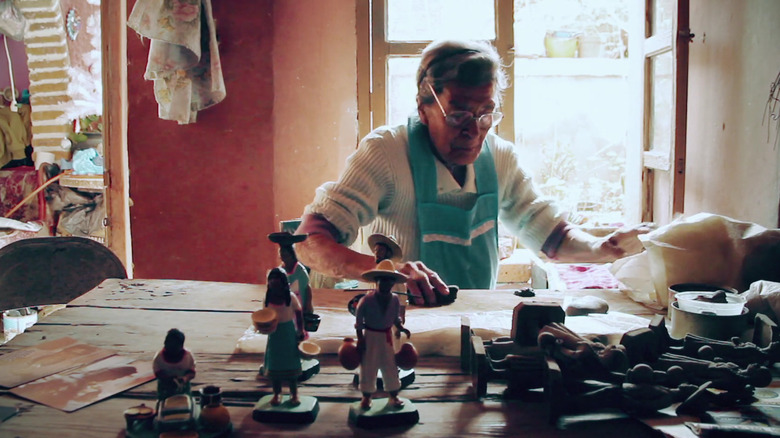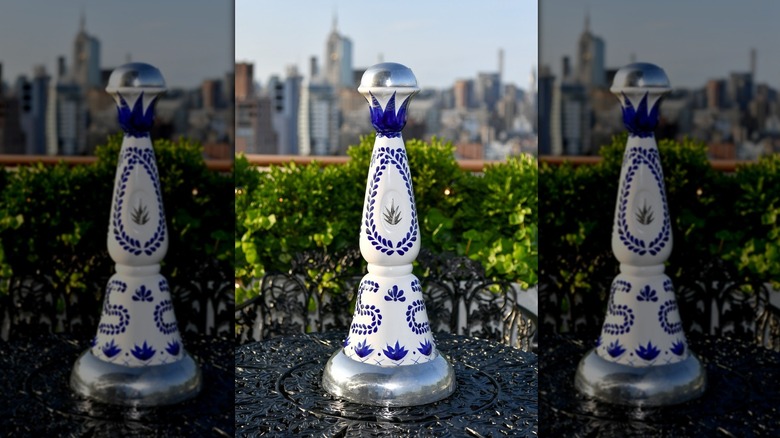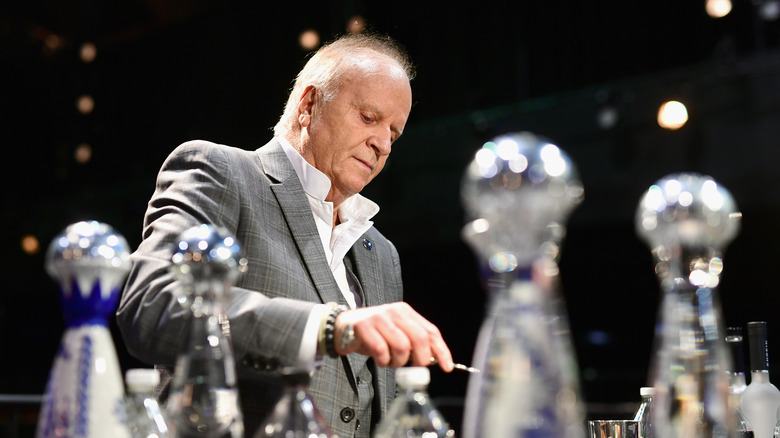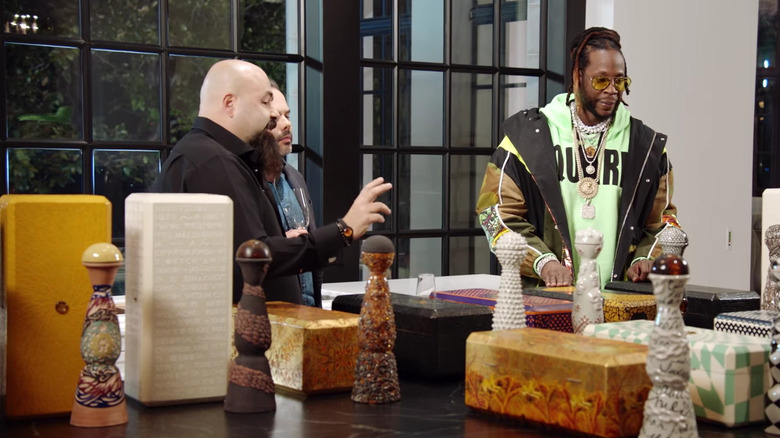Clase Azul Reposado Tequila: Everything You Need To Know
Ask any college student about tequila and they will most likely shudder as they queasily remember throwing a few shots back with the obligatory salt and lime. In fact, these harmful associations — where tequila is remembered as a spirit to shoot and then forget about as quickly as possible — are made by the wider population as well, a fact not lost on those who produce their own versions of the fiery liquid (via The Economic Times). However, as higher quality tequila permeates the global market, opinions on the oft-dismissed spirit are changing. This is no more typified than in the luxury spirit market, where tequila has seen an unmatched growth in demand (per The Spirits Business).
Leading the way in this growing industry is Clase Azul, a high-end Mexican spirit maker known around the world for both the quality of its products and the manner in which they are displayed. A vital member of Clase Azul's range of products is its flagship spirit, the Reposado Tequila. This highly lauded spirit boasts a renowned reputation, one which has been earned through great taste and exacting quality. Retailing at around $160 (per Total Wine) the reposado tequila stands as one of Clase Azul's more affordable bottles and consequently provides many with their first taste of premium quality tequila. Clase Azul reposado's status as a gateway tequila gives it enormous influence over the budding tequila market and therefore may influence the tequila industry for decades to come.
Reposado tequila was the first spirit released by Clase Azul
Arturo Lomeli's first foray into the tequila-making business was not a success. In the 1990s, his brand El Teporocho followed the market norm at the time by making cheap, low-quality tequila, with the hopes of selling it in large quantities. Unfortunately for Lomeli, this didn't work out, and the company folded soon after being founded, a fact Lomeli attributes to poor product quality and dire marketing (via CNN Business). Somewhat licking his wounds, Lomeli enrolled at ITESO, a university in Guadalajara, where he was awarded with a master's degree in global marketing (per Thrive).
Lomeli evidently learned from both his failed business venture and his studies. Clase Azul was launched in 1997 and could not be more different from his first attempt at selling tequila. This time around, Lomeli knew that a fantastic product, in every facet, was the only way to achieve success. He explained this notion to Elite Traveler, saying, "In order to compete, we had to have quality. We had to have uniqueness and we had to have a competitive advantage." Clase Azul's reposado tequila was the first spirit released by Clase Azul reaching the market in the year 2000. It typified this new ethos, not only through its excellent flavor profile but also by being packaged in the stunning ceramic decanters that have become the brand's hallmark (via Forbes).
Clase Azul is part of the high-end tequila trend
Tequila sales in the United States have been increasing steadily over the past 15 years, and this growing demand has seen vast quantities of the spirit imported from Mexico (via Statista). As previously mentioned, this growing appetite for tequila is no more clearly seen than in the luxury spirit market, where premium level tequilas are experiencing astronomical levels of growth (per The Spirits Business). A key aspect of premium tequilas, such as Clase Azul reposado, is that the spirit is made from blue agave exclusively. Unlike the bases of other popular spirits, such as grapes or grain, blue agave takes many years to mature, with five years being the industry minimum and nine years being the standard age of the plants used by Clase Azul, per Fine + Rare.
When this growing time is combined with cooking and aging processes, many of Clase Azul's tequilas — including the reposado — can take over a decade to produce from seedling to finished product. Here is the crux of an issue which dogs the luxury tequila industry: the difficulty suppliers have with meeting a growing demand. As reported by Fine + Rare, some tequila producers have taken to new technology which allows them to create tequila from much younger agave. However, Clase Azul is not one of those, and the company is prepared to limit sales in order to protect the quality of its products.
The reposado, like all Clase Azul's tequilas, is made to exacting standards
While suave marketing and sleek ceramic decanters have significantly contributed to the global success of Clase Azul, the driving force has been — and hopefully always will be — the exceptionally high quality of the spirits it produces. Of course, consistent excellence does not happen by chance, and Clase Azul follows a long, exacting, and labor-intensive protocol to ensure its spirits are amongst the best in the world.
A key facet of Clase Azul spirits is the area in which the agave is grown. Located Jesús María, a town that sits at one of the highest points in Jalisco, Clase Azul's agave plantations give rise to an agave which carries fruitier flavors as opposed to the more intense-tasting plants produced at lower altitudes (per Fine + Rare). Yet, the agave remains just the base of tequilas like the reposado. To turn the harvested plant into a high-end spirit involves cooking and a double-distillation process (via Clase Azul).
The reposado really takes on its own identity during the aging process when the spirit rests in casks that used to hold bourbon (per Fine + Rare). This aging process not only removes the tequila's harsher flavors but also allows the bourbon-soaked wood to impart new ones. Consequently, after its eight months in the barrel, the Clase Azul reposado features new flavors, such as caramel (via InsideHook).
A variety of foods pair well with Clase Azul reposado tequila
As with any great liquor, Clase Azul reposado tequila can be enhanced — or diminished — through pairings with other flavors, most frequently in the form of food (per Vine Pair). Unlike other reposados, Clase Azul's — by merit of its high altitude-grown agave — is not so powerful and peppery that only spicy or charred foods can stand up to it. Instead, this sweet, well-balanced spirit can be used to enhance gentler flavors, such as pork and cheese (per Clase Azul). This is not to say Clase Azul's reposado cannot be paired with heartier meats; notable chef Katsuji Tanabe successfully paired the tequila with beef short ribs to celebrate the launch of his new restaurant (per Chicago Food Magazine).
Perhaps the most surprising flavor that pairs well with Clase Azul's reposado tequila is chocolate. Both Clase Azul and renowned chocolate manufacturer Lindt recommend a bitter dark chocolate to be matched with the sweet reposado (via Lindt).
The bottles themselves are handcrafted works of art
Finding and occupying a unique niche is of vital importance when chasing success in a highly competitive market, and Clase Azul founder Arturo Lomeli found his niche in the most mundane of places: attached to a tabletop. "I was sitting one day looking at the leg of a gothic table, and if you look at the bottle, it's an upside-down gothic table leg," he told Elite Traveler. The bottles Lomeli is referring to are the instantly recognizable, exquisitely executed ceramic decanters, which — in various guises — carry the range of Clase Azul's spirits.
These decanters are handcrafted and hand-painted using methods from the Mazahua people, an Indigenous society with a large presence in Jalisco, the state where Clase Azul is produced. Made from high-temperature ceramics, the bottles are designed to be reused, with many being used as ornate vases and lamp bases for years after the tequila itself has been consumed (via Forbes). Not only do these decanters celebrate many aspects of Mexico's culture, but they also form a key part of Clase Azul's dedication to meaningful social change by providing meaningful, secure, and fair employment opportunities for hundreds of Mexicans. Many companies' recent fixation on sustainability has also highlighted how forward-thinking Lomeli and his company have been. While others search for sustainable packaging solutions, Clase Azul have been using one for over two decades (per Fine + Rare).
Handcrafted bottles are just one of the ways Clase Azul stands out
Despite being the founder of an extremely successful luxury brand — and all the privileges this entails — Arturo Lomeli is an extremely grounded individual who is fiercely passionate about one thing above all: the concept of uniqueness. "Let's try to do something where we can be the only ones. Our goal is to create that kingdom ... a place where people enjoy our brand, our essence, our values, and are satisfied with the way that we think, with the way that we create, with the way that we produce, and more importantly the way that we give back," he told TIG Brands.
Clase Azul is looking to expand its unique way of being beyond the spirit industry by rebranding from Clase Azul Spirits to Clase Azul Mexico. As explained by Lomeli, the change in name reflects a desire to celebrate Mexican culture in ways outside of tequila and mezcal (per Spear's). These will include some of Clase Azul's first physical spaces, such as a visitor's center, a hotel in Guadalajara, and a space used for private events, tastings, and exhibitions in Brooklyn (per Spirited Zine).
Fundación Causa Azul protects historic Mexican artistic practices
Another way in which Clase Azul sets itself apart from other luxury brands is with its penchant for giving back to the Mexican society that made it successful. This is by no means a coincidence, but rather the result of a clearly defined process that Clase Azul has had since its inception. This notion was explained by Chantal Serrano, an exec for Spirit Cartel in the U.K., to Fine + Rare: "Clase Azul really embodies these [charitable] values. Arturo Lomeli, from the start, wanted to give something and be sustainable ... He's been doing it almost from the beginning with the brand."
One of the ways Clase Azul nurtures its Mexican heritage is through the Fundación Causa Azul, a non-profit which seeks to protect traditional Mexican artistic practices and their practitioners (via Fundación Causa Azul). Through the foundation, artists are given both materialistic support — often in the form of equipment — and career guidance (per Justluxe).
Clase Azul launched a Taste of Culture dining experience
Not a brand to do things halfway, Clase Azul launched a dining experience called A Taste of Culture that is as luxurious as its tequila. Based at the Clase Azul Boutique in the popular resort city of Los Cabos on the Southern tip of Baja California, the two-hour experience features servings of five Clase Azul spirits, served alongside Mexican dishes designed to highlight each spirit's unique flavor profile, as noted by Gotham.
As vital as Clase Azul's spirits are to this exclusive experience, the entire event is rooted in celebrating Mexican culture in its entirety, as explained by Jocelyn Alfaro, who manages the experience. "We want to share a deeper understanding of Mexico's cultural richness. We also want to protect and show the world our culture, not only through our distillates, but also through our country's food," she told Gotham. Experiences such as these, where spirits are used as the vehicle to educate and inform others about Mexico's rich heritage, are most likely to become an integral part of Clase Azul as it continues to expand into the hospitality industry (per PR Newswire).
Arturo Lomeli uses Clase Azul to celebrate and protect all things Mexican
As one of the world's foremost suppliers of premium tequila, Clase Azul wields a great deal of power, both economically and socially. Fortunately, under Arturo Lomeli's leadership, Clase Azul have used its status to uplift as many people as possible. A primary example is how Clase Azul has supported those employed by it. As reported by Forbes, the vast majority of workers at Santa Maria Canchesda — where the brand's famous decanters are made — are women from impoverished backgrounds. All employees also have the opportunity to access childcare and receive money for tuition.
However, Clase Azul's self-defined remit goes much further than solely helping those immediately associated with the business. By partnering with non-profit Inroads Mexico, Clase Azul offers internships to underrepresented individuals who may face barriers — be they economic or social — in finding employment in the business sector (via Fine + Rare).
The reposado is often served at high-end events
As a tequila of such high renown, Clase Azul's reposado is often served alongside other noted brands at prestigious social and professional events. One such event that featured Clase Azul was the 2017 Screen Actors Guild Awards, one of the premier award ceremonies for film and television. Clase Azul's tequila wasn't simply served straight at the event but was rather mixed into signature cocktails designed specifically for the award show and after party (per Broadway World).
Many restaurants use their range of Clase Azul products to host their own events, sometimes pairing the drinks with Mexican cuisine (per BostonChefs.com). Others have even used the tequila for virtual events like at-home tastings (via The Supper Club Inc.). Clase Azul also collaborates with brands or companies to create bespoke tequilas, as it has for One&Only, an exclusive beachfront resort in Baja California (One&Only Palmilla). This limited run of 100 bottles is made from a blend of three Clase Azul tequilas: Plata, Añejo, and Ultra. The finished product retails at $1,000.
Clase Azul Reposado Tequila is made for sipping
Key to the success of Clase Azul has been its ability to transform tequila skeptics — who would only previously drink the spirit in cocktails or shots — into customers that enjoy sipping tequila straight. Founder Arturo Lomeli told CNN Business, "We want people to taste the tequila, to make them erase that bad memory that every single person has about low-quality tequila. You can sip it and enjoy it neat without having that nightmare of hangovers." Clase Azul reposado has been created with just that in mind, its inherent sweetness making it extremely accessible even for novice tequila drinkers (via Liquor).
The uncharacteristically sweet flavor and unbelievable smoothness on the throat have come to be a hallmark of Clase Azul's reposado. However, there are a growing number of tequila drinkers who are convinced these flavor profiles have not been achieved naturally. Many reddit threads suggest additives are used to sweeten the beverage, while YouTuber The Tequila Hombre released a video of him performing an additive test, which he claims proves the inclusion of additives in Clase Azul reposado.
Arturo Lomeli's brand is competing against numerous celebrity-backed tequilas
Celebrities' affinity for tequila is longstanding, with commercial ventures backed by the famous beginning in the 1950s (per The New York Times). The business of celebrity-backed tequila has subsequently boomed, especially in recent years. It has to be said the vast majority of these ventures seem to be predominantly economically driven, a fact that hasn't been lost on a passionate tequila consumer base, who have accused some celebrities of cultural appropriation (via Women's Wear Daily).
Many are concerned that the influx of glitzy, star-powered tequila brands will divert consumers away from authentic, Mexican-owned companies and ultimately reduce the general quality of tequila that is on the market (via Robb Report). This notion was explained by Tania Oseguera of Tequila Cazadores. She explained to Fodor's Travel, "Overall, what I feel like is lacking with these new celebrity tequila brands is education around the category as a whole as well as showing respect to the Mexican culture that this beautiful spirit originates from." As such, these tequilas stand in sharp contrast to Clase Azul, which emphasizes and celebrates Mexican culture at every opportunity. But while well-established brands, such as Clase Azul, need not pay much heed to celebrity tequila, it is troubling to think how many smaller-scale Mexican producers are being squeezed out by these vast empires.
The entire range of Clase Azul's tequilas are rarely sold in Mexico
Since its inception, Clase Azul has focused on exporting the vast majority of its tequila and mezcal to the global market, most notably the United States. Some have suggested that the lack of Clase Azul in Mexico's domestic market — apart from in famous resort cities like Los Cabos — is due to price point (per Food Manufacturing). However, Clase Azul founder Arturo Lomeli has stated that it is because the Mexican tequila market is much harder to influence (per CNN Business). This may be due to consumers already having a solid understanding of the spirit and their preferences.
The dearth of domestic sales has done little to dent Clase Azul's profitability. The company's expansion in the United States continues (per Drinks Insight Network), while the emergence of China as a potential tequila export market offers huge business opportunities (via CNN Business). Due to the lack of prior exportation to this area of the world, tequila does not even have to contend with the damaging stereotypes that have dogged it in the United States and Europe. Instead, in China, tequila may be thought of as stylish and fashionable, an evaluation that can only benefit prospective sales.
